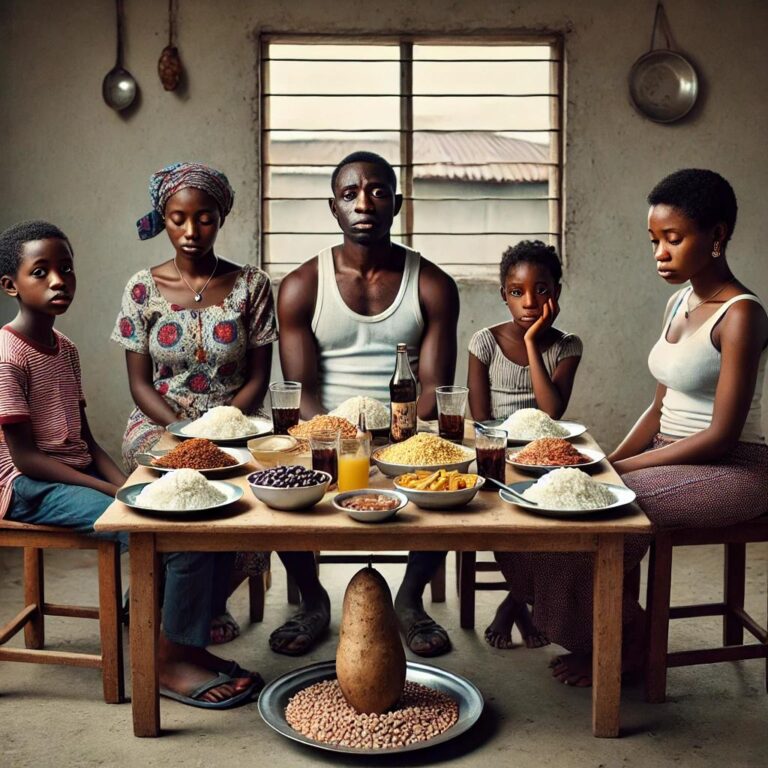With World Food Day recently celebrated on October 16, Nigerians are reflecting on the cost of feeding a family amidst inflation and economic instability.
Despite the recent increase in the minimum wage to N70,000, many breadwinners still struggle to provide three balanced meals for their families.
Health-Panorama chronicles what a Nigerian family of four can realistically afford to eat on this new minimum wage, considering rising food prices, fuel scarcity, and inflation.
The cost of living in Nigeria has skyrocketed in recent years, particularly for essential food items such as rice, beans, tomatoes, and yams. For a family of four, the most consumed staples often include:
Rice: A mainstay of the Nigerian diet, often consumed in dishes like Jollof rice, fried rice, and plain boiled rice.
Beans: Rich in protein, beans are a popular dish across Nigeria, commonly prepared as porridge or alongside staples like yam.
Tomatoes: An essential ingredient in Nigerian cooking, used to make stews, soups, and sauces.
Yam: Frequently prepared boiled, fried, or as pounded yam, it’s another energy-rich staple.
Cost of Basic Ingredients as of October 2024
To assess how far N70,000 can stretch, here’s an overview of the prices of key ingredients:
Rice : a bag of rice is currently around N80,000 to N120,000, making is averagely N1200 – N1,500 pet kg.
Beans: a bag of beans also is being sold around N90,000 to N150,000 making it cost averagely between N1800 to 2,500 per kg.
Tomatoes (basket): N18,000 – N20,000
Yam (medium tuber): N1,500 – N2,000
Palm oil (5 liters): N8,000 – N10,000
Vegetable oil (5 liters): N10,000 – N12,000
Frozen chicken (1kg): N2,500 – N3,000
With a wage of N70,000 per month, and assuming basic meals are prepared from these items, the question becomes: How much can a family afford to spend on food daily?
Cost of Preparing a Balanced Meal
Let’s consider a simple balanced meal for a family of four:
Breakfast: Yam porridge with palm oil and vegetables
2 medium yams: N3,000
Palm oil (250ml): N500
Vegetables and seasoning: N500
Total breakfast cost: N4,000
Lunch: Rice with beans, fried tomatoes, and protein (chicken or fish)
Rice (1kg): N1,200
Beans (1kg): N1,100
Tomatoes (500g): N1,000
Chicken (1kg): N3,000
Total lunch cost: N6,300
Dinner: Pounded yam with tomato stew and fish
Yam (1 medium tuber): N1,500
Tomatoes (500g): N1,000
Fish: N2,500
Total dinner cost: N5,000
Daily Food Cost for a Family of Four
On average, a family of four would need about N15,300 to feed themselves three square meals in one day.
Monthly Food Budget vs. N70,000 Minimum Wage
If a family spends N15,300 per day on food, they would require:
N459,000 per month just for meals, which is over six times the N70,000 minimum wage.
Even when cutting costs by reducing portions or opting for cheaper alternatives (such as replacing chicken with fish, or eating less meat), a monthly food budget can easily exceed N100,000, making it difficult for a family of four to live on N70,000.
Impact of Inflation and Fuel Scarcity
Inflation:
Prices of basic food items have risen steeply due to inflation, and global events like fuel price increases and currency devaluation continue to push costs higher.
Fuel Scarcity: Transportation costs directly affect food prices, making it more expensive to get produce from farms to markets. This, in turn, drives up the cost of food for the average Nigerian consumer.
While the recent increase in minimum wage is a positive step, it falls short of addressing the real issue: the cost of living crisis, which makes it nearly impossible for a family of four to afford balanced meals on N70,000 per month.
Many families are forced to skip meals, reduce portions, or rely on cheaper, less nutritious options, which poses a significant risk to their overall health.
Recent statistics on malnutrition in Nigeria show a troubling situation. Approximately 2 million children suffer from severe acute malnutrition (SAM), with only 20% receiving adequate treatment.
Nigeria has the second highest burden of stunted children globally, with a national prevalence rate of 32% among children under five. Additionally, about 11 million Nigerian children are experiencing severe food poverty.
Northern Nigeria is the hardest hit, facing both stunting and wasting, which significantly affects children’s health, education, and future productivity.
The theme for 2024 World Food Day is ‘Right to Foods for a Better Life and a Better Future.’


